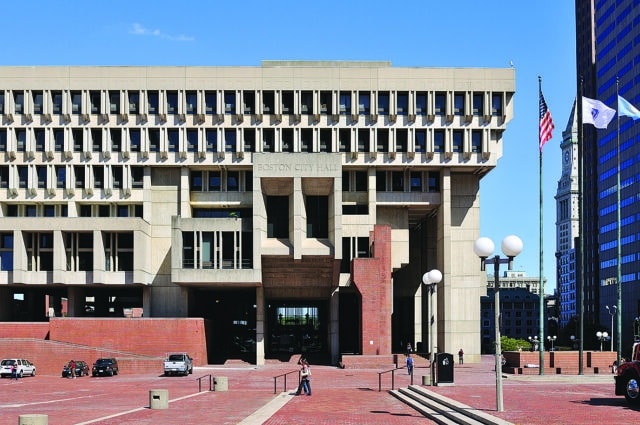Corruption at Boston City Hall? A public official on the take? Who knew?
After decades seemingly free from scandal, the spotlight is shining again on just how business is conducted at Boston City Hall, especially when it comes to high-stakes, big-money real estate projects.
John Lynch, a now former top employee of the city’s Economic Development Investment Corp., pled guilty last week to federal charges that he took a $50,000 bribe from a developer.
In exchange for the money, Lynch used his city position to get a Zoning Board of Appeals member to approve a permit extension on a South Boston condo project, boosting its value by $500,000.
A ZBA member has also both agreed to step down in wake of the scandal, and a top Walsh aide has stepped aside while the administration reviews the case.
And as the probe by U.S. Attorney Andrew Lelling heats up, a curious narrative is already emerging in the local media, one that sees Mayor Marty Walsh’s administration as an unfortunate break from supposedly squeaky-clean days of yore, when Mayor Thomas M. Menino ran the city’s bureaucracy with an iron hand.
But the idea that what we are seeing now is an aberration, and not business as usual, is laughable.
There has long been something rotten in the way City Hall does business, and it transcends any single mayor or administration. And this has especially been the case with big–ticket, high-stakes real estate projects, where a simple city permit can spell the difference between making and losing a fortune.
Does that mean bribes have been flying right and left? Probably not, but I wouldn’t discount the idea that there has been a lot more of that kind of pay-to-play over the years than we probably realize.
The approval process for new development in Boston has long been distorted and manipulated in highly questionable ways by whoever sat in the mayoral throne room on the fifth floor of City Hall.
Menino Hardly Squeaky-Clean
It’s no exaggeration to say that when Menino was mayor, no project of any significance was ever approved by the city’s then supposedly independent development arm, the old Boston Redevelopment Authority, without a thumbs–up from the mayor.
Menino’s favorite developers, who sycophantly sang his praises and forked over cash for his various campaigns and charitable setups, were rewarded with the assurance that their projects would not get tied up in red tape or blocked.
During the last year or two of his tenure, it came out that many of these same luxury condo developers skipped paying tens of millions of dollars in fees under a sweetheart deal with Menino’s BRA. The money in question had been earmarked for affordable housing, one of the mayor’s favorite public causes.

The approval process for new development in Boston has long been distorted and manipulated in highly questionable ways by whoever sat in the mayoral throne room on the fifth floor of City Hall.
More than a few big projects withered on the vine during the Menino years as well. Their developers, like bull-headed International Place builder Don Chiofaro, angered the infamously thin-skinned mayor with slights real and perceived, or sometimes just by talking up their plans in the local press.
And Menino had his own zoning board woes as well. The ZBA’s chairman, a supporter and mayoral appointee, was forced to step down in 2004 after it was revealed he helped waive through often-controversial neighborhood projects brought before the board by a developer that he was also doing legal work for.
Ironically, one of the big critics pushing for a thorough examination of the ZBA then was none other Chuck Turner, the one-time city councilor who would later go to prison for accepting a $1,000 bribe in exchange for doling out a liquor license.
No Cases? Look Harder
Touting himself as the neighborhoods’ mayor, Ray Flynn had much less of interest in the wheeling and dealing of the downtown development scene than Menino.
But there a similar, if albeit smaller-scale, bribery scandal occurred under his tenure in the 1986, when the late Harold Brown, for years the city’s largest landlord, pled guilty after he was charged by the feds for forking over $1,000 to a city official in order to get a permit to build a new apartment complex.
One reason there haven’t been more corruption cases brought against Boston officials – and more scrutiny in general of how development projects are approved – is because no one has been looking particularly hard.
The Democratic establishment in Massachusetts has never shown much interest in probing the corrupt hack culture that for as long as anyone can recall has infected both city and state government.
It’s really no coincidence, then, that the last time someone really started looking underneath all the rocks and casting light into the dark corners of city government was back in the early 1980s, when the young Reagan-appointed U.S. attorney William Weld, began to make a name for himself as a prosecutor with his probe of Mayor Kevin White administration, which put dozens of aides and businessmen in its crosshairs.
Dems Made a Devil’s Bargain
It’s a sad commentary that we are now having to rely on Lelling, another young Republican – and an appointee of Donald Trump, one of the most corrupt presidents in history – to take names and kick you know what.
Once upon a time, the progressive movement stood not just for social welfare programs, but also good government.
But over the decades, progressives learned to look the other way as big city Democratic machine hacks lined their pockets in a devil’s bargain to get their cherished social programs passed.
It’s time for progressives in Massachusetts and across the country to rediscover their roots and start policing their own ranks.
If not, Republicans like Lelling will be more than happy to do it and then send them the bill afterwards.
Scott Van Voorhis is Banker & Tradesman’s columnist; opinions expressed are his own. He may be reached at sbvanvoorhis@hotmail.com.






